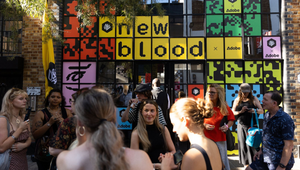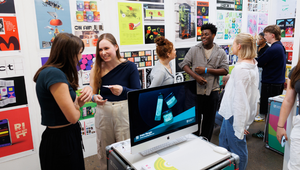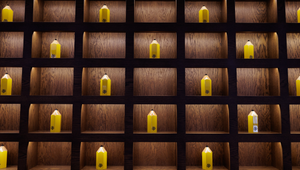
D&AD 2024: Take a Winning Chance on LGBTQIA+ Inclusive Marketing

Above (left to right): Mark, Kendra and Anna. Image credit: D&AD
With every next day, May’s end is nearing and besides the summer weather, the industry is (or should be) excited about the start of another Pride Month in June. In line with this, when we at LBB found out that Outvertising was taking the stage at D&AD 2024 yesterday, we were first in the queue.
Mark Runacus, the non-executive chair of the organisation and Kendra Rogers, Outvertising’s co-director of intelligence came together to tell D&AD’s attendees about the receptiveness of the LGBTQIA+ community when it comes to advertisers, as well as the queer community’s expectations of the media they consume.
Their session showcased key findings from the Outvertising Consumer Report and a snapshot of a range of commercial sectors where there are incredible opportunities to connect with the LGBTQIA+ community, as well as their allies. Speaking of allies, Anna McInally, head of brands at the National Lottery also joined Mark and Kendra for a discussion on the leap that the National Lottery took when they told the story of a gay couple that kept trying until they finally won.
“I want to make it clear,” said Mark when starting the session, “we’re not here to talk about how we can equip you to only communicate with a queer audience. We’re here to talk about how you can communicate authentically. And how you can include us in your communications, which is done by bringing queer people into communications and changing attitudes first. Unfortunately, some of these attitudes are going backwards.”
Referring to Stonewall, Mark explained that still today, the number one reason that young people are discriminated against is because of their sexuality, with 40% of gen z and millennials saying that they have personally experienced discrimination. Beyond this, the International Lesbian, Gay, Bisexual, Trans and Intersex Association (IGLA) came out with its latest table, rating European states on their receptiveness towards queer folk. The UK ranked in 16th place, a major setback from their first place position in the 2015 table.
Against the backdrop of these disheartening numbers and the knowledge that being LGBTQIA+ friendly is good for business, Outvertising decided to come up with a real, robust and trustworthy insight into the queer community - their newest consumer report.
Before sharing some of the most interesting insights from the report, Kendra took a moment to discuss why LGBTQIA+ inclusion matters, beyond just the moral case. “There are real individuals behind these brands and campaigns. When you’re building inclusive communications, the people within your organisation will undoubtedly feel more supported.” The data pointed out that the younger cohort has the largest groups of people identifying as bisexual, with 13% of gen z, which is twice as many as there are people identifying as gay or lesbian.
Mark added that if you look at these same statistics “after a couple of pints of lager, and ask people who people have sex with” you will find that about one third of the population does not consider themselves to be 100% straight. “After those same two pints of lager, if you ask young people who they have sex with, that is over half.” The message to brands and agencies is clear - if you work with or for young people, “you need to think very queer.”
Talking more data, Kendra revealed that 67% of LGBTQIA+ people are likely to recommend products based on ads, with the number increasing for gen z and decreasing for non-queer people. LGBTQIA+ people also have been revealed to have a higher expectation for advertising, asking brands to feature “real people”. Overall, they prefer tailored advertising and are a more “discerning audience,” craving authenticity and messaging that resonates with their experiences.
But brands shouldn’t be fooled by all the ‘young people’ statistics, because as Mark reminded, “queers love TikTok but we don’t spend our lives on it.” In fact, Outvertising’s report showed that the queer community still loves traditional channels for advertising like print, out of home and TV, with which they have a particularly special relationship.
Moving the conversation towards allyship, Anna McInally spoke about her dedication to the community as an ally, particularly through The National Lottery’s 2023 campaign ‘Pockets’. The advert tells the 30-year-long love story of a gay couple - Edward and Isaac - that has held onto each other through trials and tribulations. During the ‘90s and early ‘00s, as the landscape changed drastically for queer people, one of the things Isaac and Edward held onto was their dedication to playing the National Lottery. Until one day, they won.
The beautiful campaign, resulting in quite a lot of teary eyes in the audience at D&AD, came as a result of Anna’s realisation that speaking up on what matters most makes an incredible difference for the community, especially when it comes from somebody on the outside of it.
“As somebody who has the opportunity and privilege to look across intersectional identities, speaking up is a much less emotionally fraught thing to do than it would be for somebody who is of that identity,” said Kendra. “Sometimes asking, ‘Why does this couple have to be heterosexual?’ is a much easier conversation to have as an ally.”
Talking more about ‘Pockets’, Anna explained that the brief started at celebrating the tenacious believers, the people that play the lottery throughout their lives and never give up on hope. “At first, the team came up with the wonderful idea about a couple that got together at the beginning, when the National Lottery started in 1994. They then went through lots of twists and turns in their life but one thing that stayed true was the hope they kept, because of which they continued to play.”
After researching the idea, the feedback that the team received was that the storyline, while great, feels quite traditional. It was the agency that asked the question, “Why does this couple have to be heterosexual?”.
“That person explained to me, as a gay guy, what the last 30 years have been like, what the gay community has been through, with all of its celebrations and challenges. And I thought ‘God, that feels like a tenacious believer to me. Someone that never gives up.’ It was a wonderful way to make this idea stronger,” explained Anna.
In line with this idea that authenticity needs to be on top of everything LGBTQIA+ that brands do, Anna explained that during a few moments she felt that she was unsure of what was right or wrong, as a straight woman herself. To aid this, the brand hired the agency On Road, who brought in a panel of 40 gay men, who were present at the making of the campaign to advise and consult for the brand.
Unfortunately, creating a campaign with two gay characters at the centreis still considered taboo for some. Anna explained that there were some expected wobbles, with senior stakeholders appearing “uncomfortable” about what the brand had created. She said, “It’s quite interesting. People don’t necessarily say they feel uncomfortable, but you can feel it in the room. We had to make sure that we stood united in what we believe in.”
To tackle this, the National Lottery team came up with a robust FAQ process (which never got used, as nobody asked any questions) and tested the ad numerous times, which only cemented their belief in the idea.
Closing the session, Anna said that brands should always be looking for ways to represent the people that they want as part of their audience. “You always need to be learning, there’s constantly new things to be learned about your customers. And actually, whilst there’s opportunities to learn about what brings people together, there are really interesting elements that sets them apart and makes them different. Think about those on an ongoing basis!”
Mark touched on the importance of sticking to being an ally for the long run and not jumping into the deep end from the get-go. “You shouldn’t do this kind of thing if it’s not concorded with your brand. And you don’t have to jump in with TV, as Anna did here. Make sure you have an authentic journey - start small, build your credentials with the community and then carry on to the bigger steps. In the unlikely event that there is backlash, stick to your principles and do not back down!”















